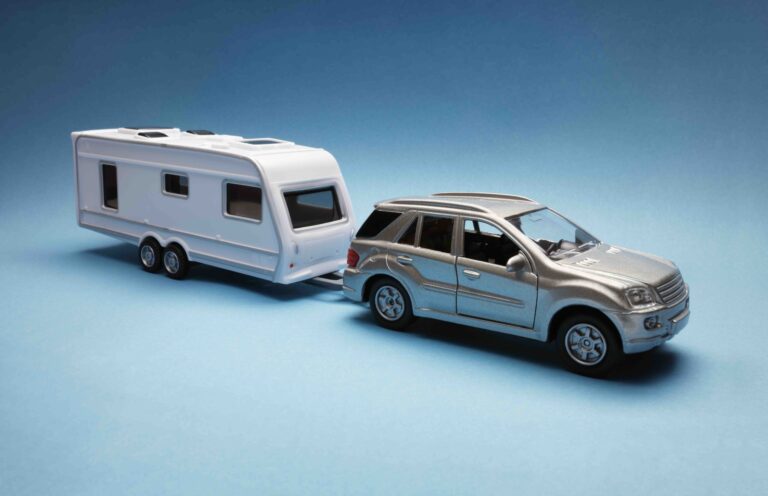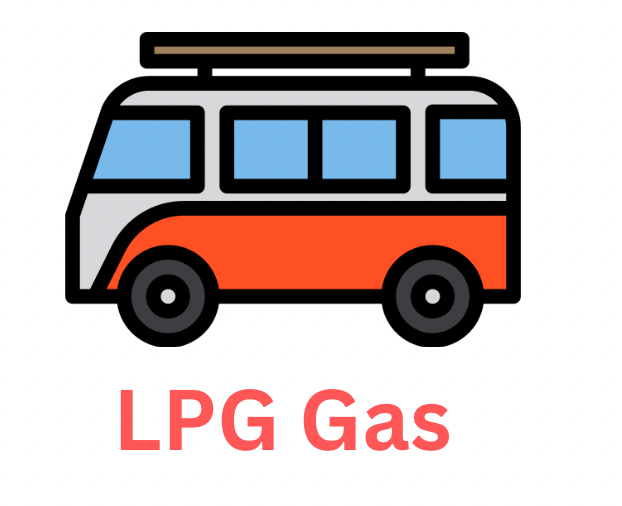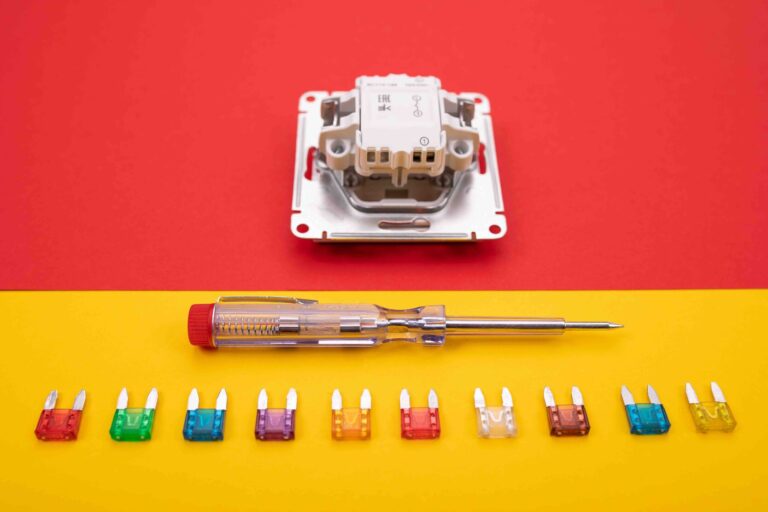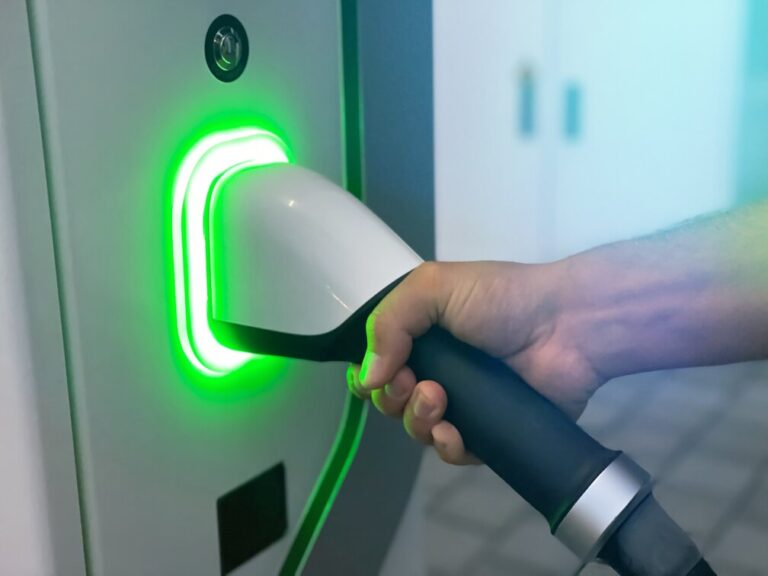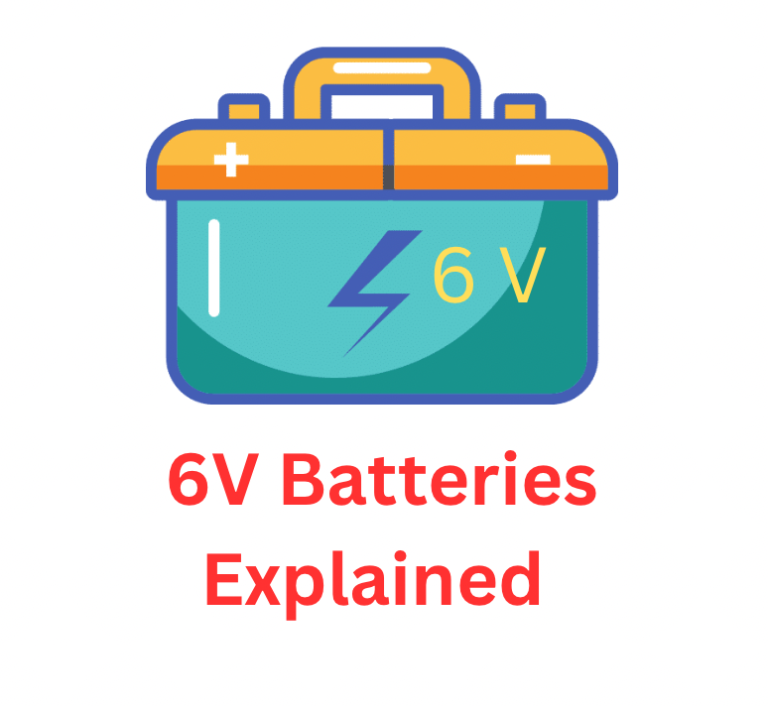Portable Solar Panels for RV’s : Mini Guide
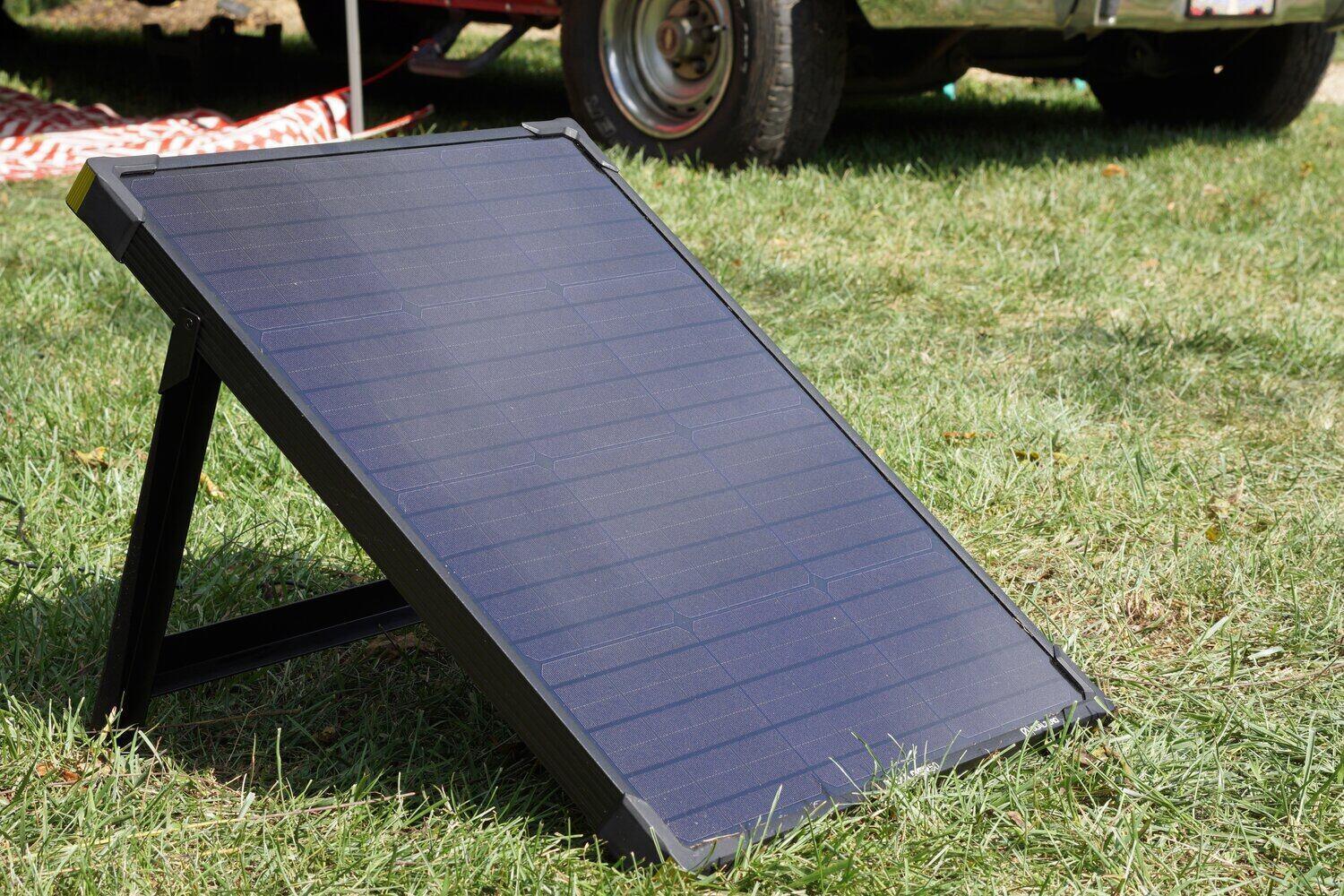
Portable Solar Panels?
Exploring the outdoors and getting away from the stress of everyday life can be great in your RV. However, and I know this first hand , it can be difficult to stay powered up when you’re off the grid.
That’s where portable solar panels come in. I currently have 350W of portable solar panels and I would be lost with out this power .
Portable solar panels are a great way to generate your own electricity while you’re RVing. They’re easy to set up and use, and they can provide you with all the power you need to keep your devices charged, your lights on, and your appliances running.
In this mini guide, we’ll discuss everything you need to know about portable solar panels for RVs. We’ll cover topics such as:
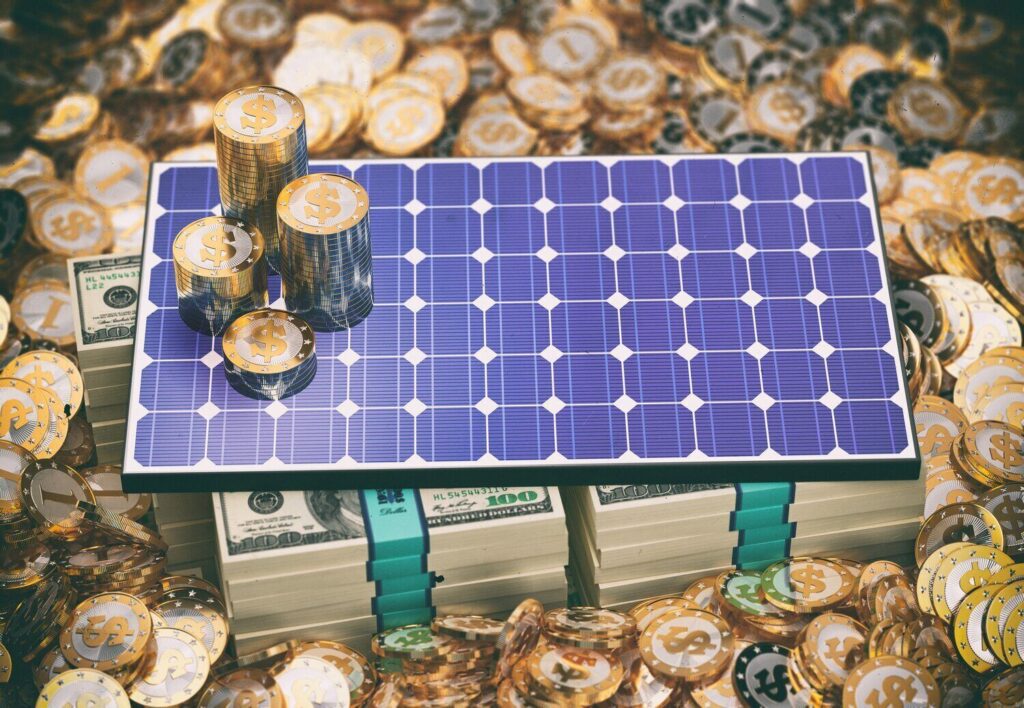
Understanding the Benefits of Portable Solar Panels for RV
Portable solar panels are a game-changer in the world of recreational vehicles (RVs).
Their benefits extend beyond just providing an eco-friendly power source.
Portable solar panels are a game-changer for RVers
Portable solar panels offer a number of benefits for RVers, including:
- Freedom from the grid: Portable solar panels allow you to generate your own electricity, which means you can be free from the constraints of traditional power sources. This is especially beneficial if you plan on boondocking or camping in remote areas.
- Cost savings: Portable solar panels can save you money on your RV’s electrical bill. This is because you will no longer need to pay for campground hookups or generator fuel.
- Environmentally friendly: Portable solar panels are a clean and renewable source of energy. This means that they do not produce any emissions, which can help to protect the environment.
- Convenience: Portable solar panels are easy to set up and use. You can simply place them in direct sunlight and connect them to your RV’s battery system.
- Durability: Portable solar panels are designed to withstand the elements. They can be used in hot, cold, and rainy weather.
- Increased flexibility: Portable solar panels give you the flexibility to camp in any location, regardless of whether or not there are power hookups available.
- Peace of mind: Knowing that you have a backup power source in case of an emergency can provide peace of mind while you are RVing.
- Improved resale value: Adding portable solar panels to your RV can increase its resale value.

Selecting the Right Portable Solar Panel for Your RV
Locating the ideal transportable solar panel for your RV can be a game-shifter.
The key is understanding what you need and doing some research beforehand before making a costly mistake ?.
- Wattage: The wattage of a solar panel is a measure of its power output. The higher the wattage, the more power the panel can generate. You will need to determine how much power you need to run your RV’s appliances and devices in order to choose the right wattage panel.
- Size and weight: Portable solar panels come in a variety of sizes and weights. You will need to choose a panel that is the right size and weight for your RV and your needs. If you plan on transporting the panel on a regular basis, you will want to choose a lightweight panel.
- Type of panel: There are two main types of solar panels: monocrystalline and polycrystalline. Monocrystalline panels are more efficient than polycrystalline panels, but they are also more expensive. Polycrystalline panels are less efficient, but they are also less expensive.
- Sunlight exposure: The amount of sunlight exposure your RV will receive will affect the amount of power your solar panel can generate. If you plan on boondocking or camping in remote areas, you will need to choose a panel that can generate enough power even in low-light conditions.
- Durability: Portable solar panels are designed to withstand the elements. However, some panels are more durable than others. If you plan on using your panel in harsh weather conditions, you will need to choose a panel that is made from durable materials.
- Price: Portable solar panels can range in price from a few hundred dollars to several thousand dollars. You will need to set a budget before you start shopping for a panel.
Key Takeaways
- Determine your energy needs. How much energy do you typically use in a day while on an adventure with your vehicle or motorhome? This will help you choose a solar panel with the right wattage.
- Consider the different types of panels available. There are three main types of solar panels: monocrystalline, polycrystalline, and thin-film. Each type has its own benefits and drawbacks, so you’ll need to decide which one is right for you.
- Decide between fixed and ground-based systems. Fixed systems are mounted to the roof of your RV, while ground-based systems are placed on the ground. Fixed systems are more convenient, but ground-based systems allow you to position the panels in the best possible location for sunlight exposure.
- Consider your electrical infrastructure. Make sure that the solar panel you choose will work well with the existing electrical infrastructure within your RV. This includes the size of your RV’s battery bank and the type of charge controller you are using.
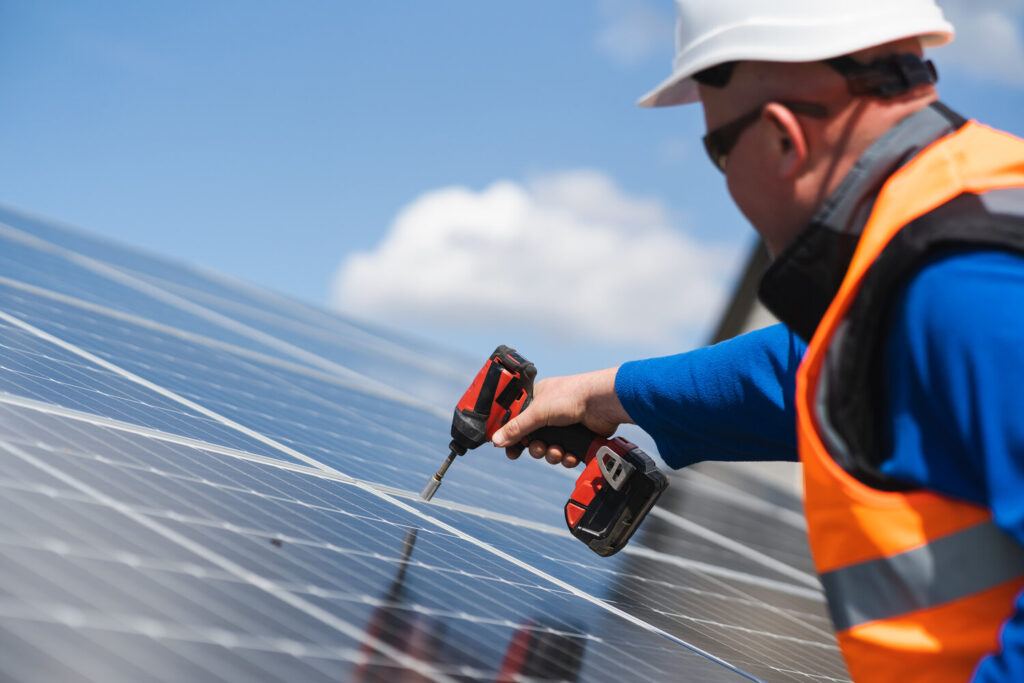
Installing a Portable Solar Panel on Your RV
Once you have chosen the right portable solar panel for your RV, you will need to install it. This is a relatively simple process, but there are a few things you need to keep in mind.
- Choose the right location. The best location for your solar panel will depend on the type of panel you have and the amount of sunlight you receive in your area. For fixed systems, the roof of your RV is the most common location. However, if you have a ground-based system, you can position the panels in the best possible location for sunlight exposure.
- Secure the panel. Once you have chosen the location for your solar panel, you need to secure it in place. This is especially important for fixed systems, as you do not want the panel to come loose in high winds.
- Connect the panel to your RV’s electrical system. This will require some basic electrical knowledge, but it is not too difficult. You will need to connect the panel to your RV’s battery bank and a charge controller.
- Test the system. Once you have connected the panel to your RV’s electrical system, you need to test it to make sure it is working properly. You can do this by turning on some of your RV’s appliances and devices and seeing if they are powered by the solar panel.
Additional tips:
- Read the instructions carefully. The instructions that come with your solar panel will provide you with specific instructions on how to install it. Make sure to read them carefully before you start.
- Use the right tools. You will need some basic tools to install a solar panel on your RV. These include a drill, screwdriver, and wire strippers.
- Be careful not to overtighten the screws. Overtightening the screws can damage the solar panel.
- Test the system regularly. It is a good idea to test your solar panel system regularly to make sure it is working properly. This will help you to catch any problems early on.
Installing portable solar panels for your RV is easier than you might think. No electrical expertise or specialized equipment is required for the installation of a portable solar panel on your RV.
The first step is finding the perfect spot on your roof where sunlight can reach without obstruction. This resource provides helpful tips and tricks for optimal panel placement.
Prioritize safety when climbing onto the roof of your vehicle:
- A sturdy ladder will help prevent accidents.
- Safety harnesses are also recommended if working at heights makes you uncomfortable.
By following these tips, you can easily install a portable solar panel on your RV and start enjoying the benefits of solar power.
Maintaining and Troubleshooting Portable Solar Panels for RV
Maintaining your portable solar panel is crucial to their longevity.
- Clean your portable solar panels regularly. Dust, dirt, and debris can build up on your solar panels and reduce their efficiency. You can clean them with a soft cloth or sponge. Avoid abrasive materials as these might scratch the surface of the panels, reducing their efficiency.
- Inspect the panels for damage. Look for cracks, chips, or other damage that could affect the performance of the panels. If you find any damage, you should have the panels repaired or replaced.
- Store the panels properly. When you are not using your solar panels, you should store them in a cool, dry place. This will help to protect them from the elements and keep them in good condition.
Troubleshooting your portable solar panel
- Check the connections. Make sure that the connections between the solar panels, the charge controller, and the battery are secure. Loose connections can cause problems with the performance of the system.
- Check the charge controller. The charge controller is responsible for regulating the flow of electricity from the solar panels to the battery. If the charge controller is not working properly, it can prevent the battery from charging properly.
- Check the battery. The battery is where the electricity from the solar panels is stored. If the battery is not in good condition, it will not be able to store enough electricity to power your RV’s appliances and devices.
If you are having problems with your portable solar panel, you should first check the connections and the charge controller. If you have checked these and the problem persists, you may need to have the panels or the battery repaired or replaced.
Here are some additional tips for maintaining and troubleshooting your portable solar panel:
- Read the instructions carefully. The instructions that come with your solar panel will provide you with specific instructions on how to maintain and troubleshoot it.
- Use the right tools. You may need some basic tools to maintain and troubleshoot your solar panel. These include a screwdriver, wire strippers, and a multimeter.
- Be careful not to damage the panels. Overtightening the screws or using harsh chemicals can damage the panels.
- Test the system regularly. It is a good idea to test your solar panel system regularly to make sure it is working properly. This will help you to catch any problems early on.
By following these tips, you can help to ensure that your portable solar panel will last for many years to come.
Additional tips:
- Clean your portable solar panels regularly with a soft cloth or sponge to ensure they are free from dust and debris that could impede sunlight absorption; avoid abrasive materials as these might scratch the surface of the panels, reducing their efficiency. Remember not to use abrasive materials as these might scratch the surface of the panels, reducing their efficiency.
- Besides cleanliness, check for any signs of wear or damage frequently. If you spot cracks on the panel’s surface or loose connections in wiring, it may be time for some repairs.
- In case of technical issues like low power output despite optimal conditions, troubleshooting comes into play. Using an instrument designed to measure electric current, voltage, and resistance accurately can help identify where problems lie within your system.
- The first step would be checking if all wires are properly connected and there aren’t any obstructions blocking sunlight from reaching your panel(s).
- If the manufacturer’s manual does not resolve your issue, consult it for instructions tailored to your device model. This could offer the necessary direction to address the issue. Bear in mind that every apparatus could be different, hence the solutions may differ depending on the kind and make you’re utilizing. Always consult a professional if you are unable to fix it yourself to avoid causing further harm to the equipment.

Maximizing Efficiency with Portable Solar Panels for RV
The efficiency of your portable solar panels can make or break your off-grid adventure.
Portable solar panels can be a great way to power your RV while you’re off the grid. However, in order to get the most out of your solar panels, you need to make sure they’re installed and maintained properly.
Here are a few tips for maximizing the efficiency of your portable solar panels for RV:
- Choose the right location. The best location for your solar panels will depend on the type of panel you have and the amount of sunlight you receive in your area. For fixed systems, the roof of your RV is the most common location. However, if you have a ground-based system, you can position the panels in the best possible location for sunlight exposure.
- Secure the panel. Once you have chosen the location for your solar panel, you need to secure it in place. This is especially important for fixed systems, as you do not want the panel to come loose in high winds.
- Clean the panels regularly. Dust, dirt, and debris can build up on your solar panels and reduce their efficiency. You can clean them with a soft cloth or sponge. Avoid abrasive materials as these might scratch the surface of the panels, reducing their efficiency.
- Optimize the tilt angle. The tilt angle of your solar panels can have a significant impact on their efficiency. In general, you want to tilt your panels so that they face the sun as directly as possible. However, the exact tilt angle will depend on your latitude and the time of year.
- Use a charge controller. A charge controller is a device that regulates the flow of electricity from your solar panels to your battery. This helps to ensure that your battery is not overcharged, which can damage it.
- Use the right size panels. The size of your solar panels will depend on your RV’s power needs. If you have a small RV, you may only need a few small panels. However, if you have a large RV or if you use a lot of power, you may need a larger system.
In addition to these tips, you can also maximize the efficiency of your portable solar panels by:
- Using a tracking system. A tracking system can automatically adjust the tilt angle of your solar panels throughout the day to maximize sunlight exposure. This can be a good option if you live in an area with a lot of sunlight variation.
- Using a bypass diode. A bypass diode is a device that can help to protect your solar panels from damage caused by shading. If one of your solar panels is shaded, the bypass diode will divert the current from that panel to the other panels, preventing the shaded panel from being damaged.
- Using a surge protector. A surge protector can help to protect your RV’s electrical system from damage caused by power surges. This is a good idea if you live in an area with a lot of lightning or other electrical disturbances.
By following these tips, you can maximize the efficiency of your portable solar panels for RV and get the most out of your solar power.
Additional tips:
- Clean your portable solar panels regularly with a soft cloth or sponge to ensure they are free from dust and debris that could impede sunlight absorption; avoid abrasive materials as these might scratch the surface of the panels, reducing their efficiency. Remember not to use abrasive materials as these might scratch the surface of the panels, reducing their efficiency.
- Besides cleanliness, check for any signs of wear or damage frequently. If you spot cracks on the panel’s surface or loose connections in wiring, it may be time for some repairs.
- In case of technical issues like low power output despite optimal conditions, troubleshooting comes into play. Using an instrument designed to measure electric current, voltage, and resistance accurately can help identify where problems lie within your system.
- The first step would be checking if all wires are properly connected and there aren’t any obstructions blocking sunlight from reaching your panel(s).
- If the manufacturer’s manual does not resolve your issue, consult it for instructions tailored to your device model. This could offer the necessary direction to address the issue. Bear in mind that every apparatus could be different, hence the solutions may differ depending on the kind and make you’re utilizing. Always consult a professional if you are unable to fix it yourself to avoid causing further harm to the equipment.
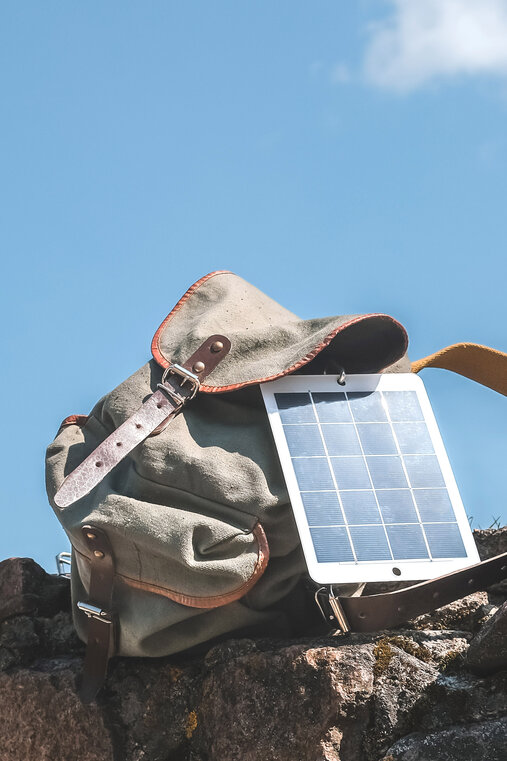
Best for Light Usage
If you are only using a few small appliances and devices in your RV, you may be able to get away with a small, portable solar panel system. These systems are typically less expensive than larger systems, and they are easy to set up and use.
Some of the best portable solar panels for light usage include:
Goal Zero Nomad 50 – This panel is lightweight and portable, making it easy to take with you on your RV adventures. It produces 50 watts of power, which is enough to power small appliances like a laptop or a fan.
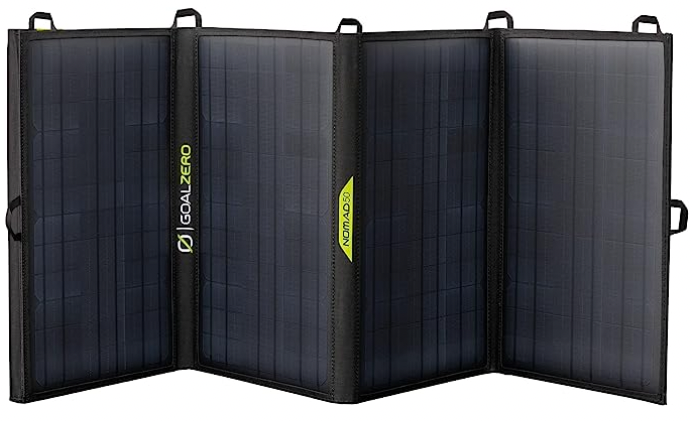
Jackery SolarSaga 100W– This panel is also lightweight and portable, and it produces 100 watts of power. It comes with a built-in kickstand, so you can easily adjust the angle of the panel to maximize sunlight exposure.
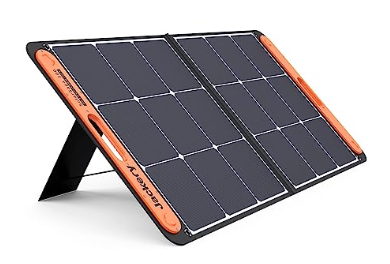
Renogy 100W Portable Solar Panel – This panel is a bit larger than the previous two panels, but it still produces a good amount of power (100 watts). It is also more durable, making it a good choice if you plan on using it in harsh environments.
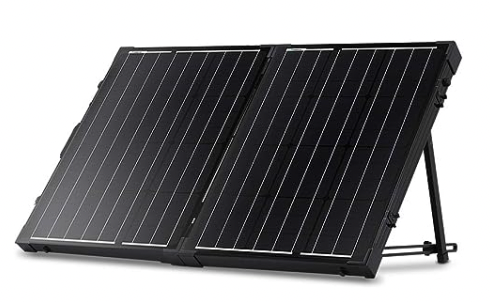
These are just a few of the many portable solar panels that are available for light usage. When choosing a panel, be sure to consider the size of your RV, the appliances you plan on using, and the amount of sunlight you receive in your area.
Here are some additional factors to consider when choosing a portable solar panel for light usage:
- Portability: The panel should be lightweight and easy to transport.
- Durability: The panel should be able to withstand the elements.
- Efficiency: The panel should be able to convert sunlight into electricity efficiently.
- Price: The panel should be affordable
Tips For Maximizing Efficiency
To get the most out of these panels, ensure they are always exposed to direct sunlight during peak hours (9 AM – 4 PM).
Maintain them regularly by cleaning off any dust or debris that may hinder their performance. Also, remember that keeping electronics charged rather than letting them deplete completely before charging is more energy-efficient with solar power systems. Remember: The goal here isn’t massive power production but reliable functionality when needed.
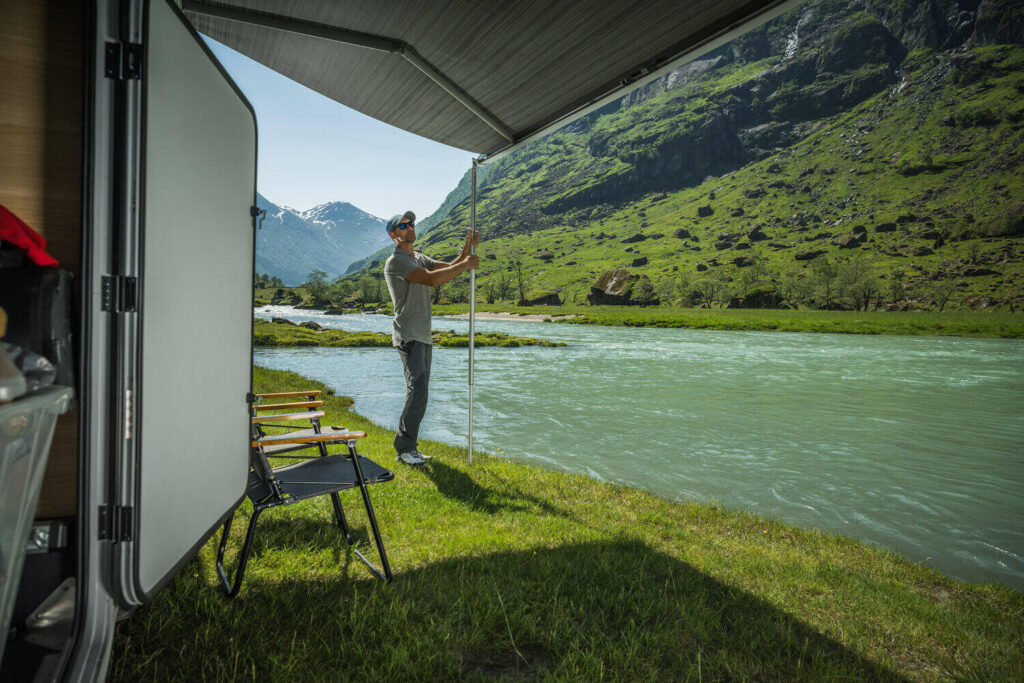
Best for Weekend Trips
If you’re a weekend warrior, finding the right portable solar panel is crucial.
here are 3 best portable solar panels for the weekend:
Renogy 100W Foldable Solar Panel. This panel is a great option if you are looking for a lightweight and portable panel. It produces 100 watts of power, which is enough to charge your laptop, a few lights, and a small fan. It is also very durable and can withstand the elements.
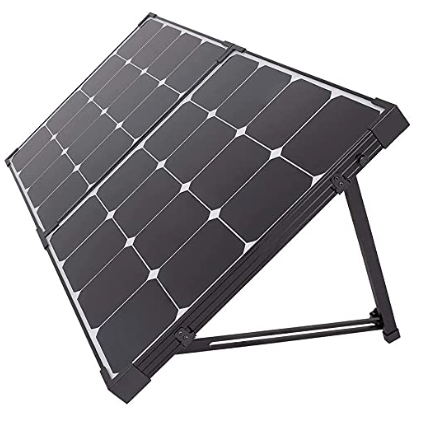
Jackery SolarSaga 200W Portable Solar Panel. This panel is another great option for weekend trips. It is just as lightweight and portable as the Renogy panel, but it also comes with a built-in kickstand, so you can easily adjust the angle of the panel to maximize sunlight exposure.
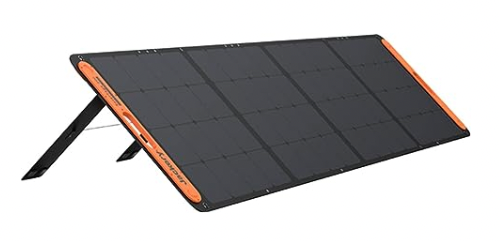
Goal Zero Nomad 100W Portable Solar Panel. This panel is the smallest and lightest of the three panels, making it a great option if you are looking for a panel that is easy to pack and carry. It produces 50 watts of power, which is enough to charge your phone, a tablet, or a small speaker.
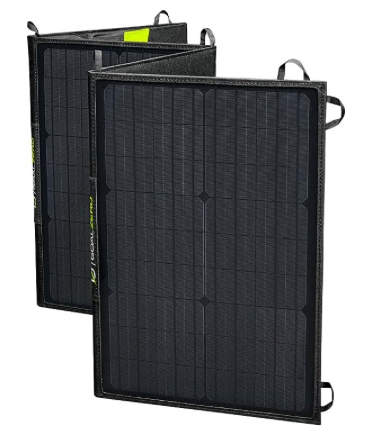
Key takeaway
- Choose the right panel for your needs. As mentioned earlier, the size and power output of the panel will depend on the appliances and devices you plan on using. If you are only planning on using small appliances, such as a phone, a tablet, or a small speaker, you can get away with a smaller panel. However, if you plan on using larger appliances, such as a laptop or a refrigerator, you will need a larger panel.
- Place the panel in a sunny spot. The more sunlight the panel receives, the more power it will generate. So, try to place the panel in a spot where it will receive direct sunlight for most of the day.
- Keep the panel clean. Dust and dirt can reduce the efficiency of the panel, so it is important to keep it clean. You can clean the panel with a soft cloth or sponge.
- Use a charge controller. A charge controller is a device that regulates the flow of electricity from the solar panel to your battery. This helps to prevent your battery from being overcharged, which can damage it.
- Be aware of the weather conditions. If the weather is cloudy or rainy, the panel will not generate as much power. So, if you are planning on using the panel on a cloudy day, you may want to pack a backup power source, such as a portable power station.
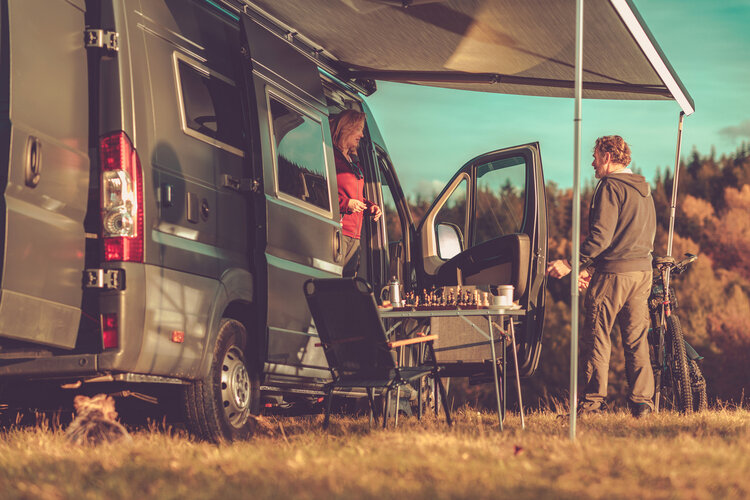
Selecting Solar Panels for Boondocking
You’ll need a panel with high wattage output and excellent efficiency ratings. Aim for at least 200 watts if you plan on boondocking regularly, as it will provide enough power even during cloudy days.
Sizing Your System Correctly
To size your system correctly, calculate the total daily consumption of all your devices then add about 20% more capacity as a buffer. This ensures that you have ample supply no matter what happens out there in the wilds.
Best portable solar panels for boon-docking:
Renogy 200W Portable Solar Panel .This panel is a great option if you are looking for a powerful and durable panel. It produces 200 watts of power, which is enough to power most appliances and devices. It is also very durable and can withstand the elements.
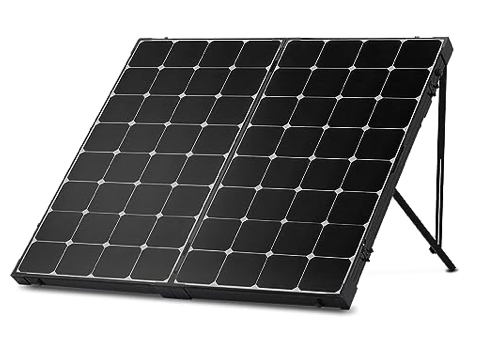
Allpowers SP033 200W Portable Solar Panel. This panel is a good option if you are looking for a budget-friendly panel. It produces 200 watts of power, and it is very lightweight and portable.
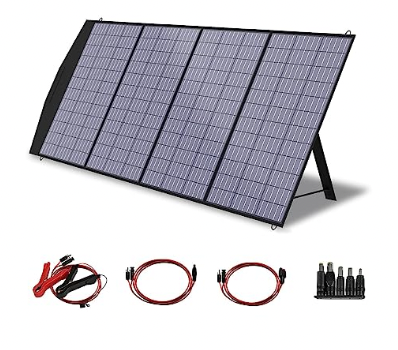
BLUETTI Solar Panel PV200 .This panel is a bit more expensive than the other two panels, but it is also more versatile. It can be folded up into a compact package, making it easy to transport.
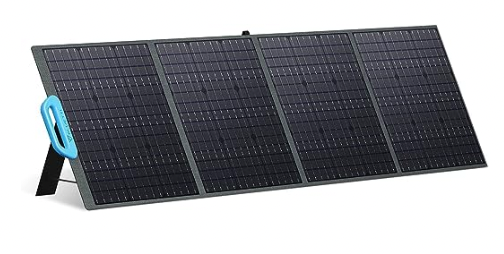
Best portable solar panels for High Electricity Consumption.
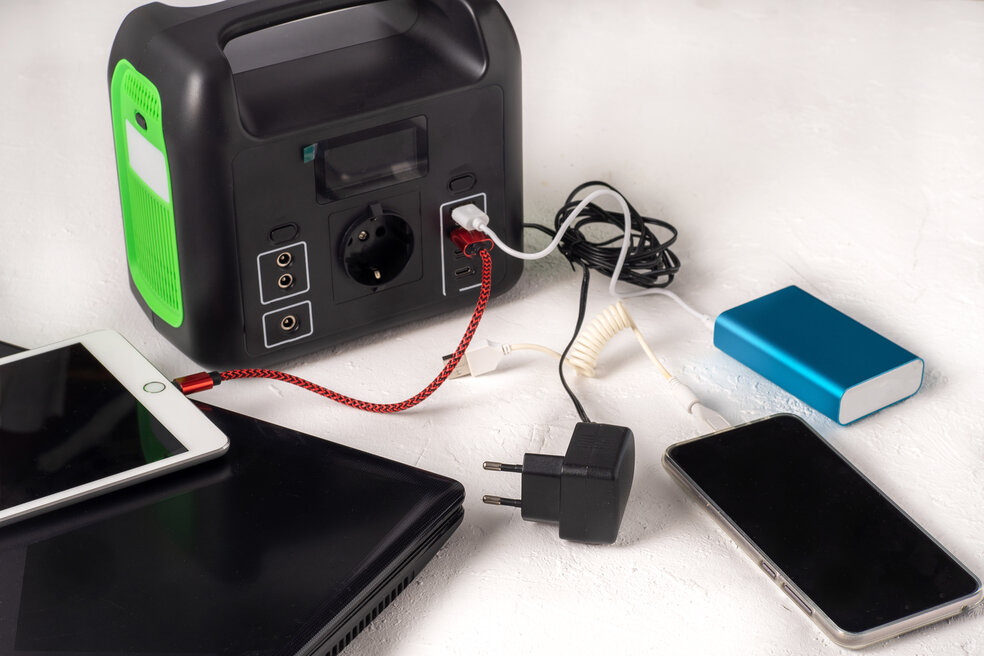
If you are an RV enthusiast with high electricity needs, a powerful portable solar panel system is essential. Your devices, appliances, and systems may require more power than the average user’s. This could include things like laptops, TVs, refrigerators, and even AC units.
A robust solar panel system will provide you with the power you need to keep your RV running smoothly, even when you are off the grid. When choosing a solar panel system, be sure to consider the size of your RV, the appliances you plan on using, and the amount of sunlight you receive in your area.
2 of the Best portable solar panels for high electricity consumption over 300 watts:
BLUETTI Solar Panel PV42000W Foldable Solar Panel. This is a great option if you are looking for a powerful and versatile solar panel system. Monocrystalline solar cells along with 23.4% solar conversion rate, PV420 can generate about 2kWh electricity per day, enough to run your electronics for hours.
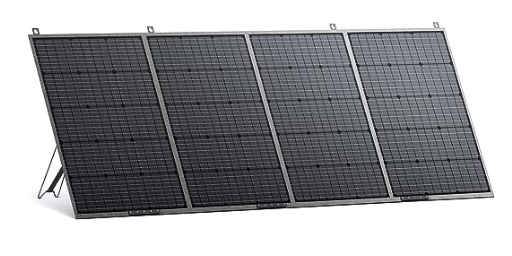
Allpowers SP035 300W Portable Solar Panel. This panel is a good option if you are looking for a budget-friendly panel that produces a lot of power. It produces 300 watts of power, and it is very lightweight and portable.
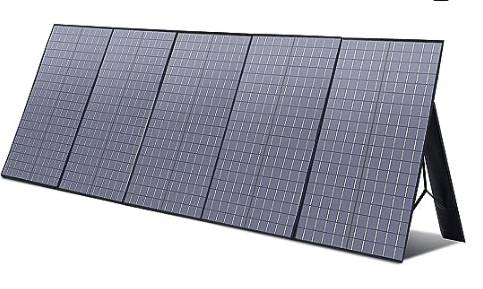
TIPS
- Look for a system with a high wattage rating. This will ensure that the system can generate enough power to meet your needs.
- Choose a system with a durable and weatherproof design. This will protect the system from the elements and ensure that it lasts for many years.
- Consider a system with a built-in battery. This will allow you to store excess power for use when the sun is not shining.
Best Off-Grid Power Solution for Full-Time Motorhome Life
If you are living in an RV full-time, you need a reliable source of power. This is especially true if you plan on spending a lot of time off the grid. There are a few different off-grid power solutions available, but the best one for you will depend on your specific needs and budget.
Here are a few of the most popular off-grid power solutions for full-time RV life:
Solar panels: Solar panels are a great option for off-grid power because they are renewable and environmentally friendly. They can also be relatively affordable, depending on the size and wattage of the system you choose. However, solar panels do not generate power at night or on cloudy days, so you will need a backup power source if you plan on being off the grid for extended periods of time.
Generators: Generators are another popular option for off-grid power. They are not as environmentally friendly as solar panels, but they can generate power 24/7. Generators can be a bit noisy, so you may want to consider a quieter model if you plan on boondocking in quiet areas.
Portable power stations: Portable power stations are a great option for RVers who need a portable power source. They can be charged using solar panels, generators, or the electrical grid. Portable power stations are a good option if you plan on doing a lot of camping or hiking, as they can be easily transported and used to power your devices.
The best off-grid power solution for you will depend on your specific needs and budget. If you are looking for a renewable and environmentally friendly option, solar panels are a great choice. If you need a power source that can generate power 24/7, a generator is a good option. And if you need a portable power source, a portable power station is a good choice.
CONSIDERATIONS HERE
- Determining Your Energy Needs
- Lifestyle Considerations
- Budget Constraints
FAQs: in Relation to Portable Solar Panels for Rv
Q:How effective are solar panels on an RV?
A: Solar panels can be highly effective for RVs, providing a reliable and renewable source of power. Their efficiency depends on factors like panel quality, sunlight exposure, and energy consumption.
Q: How many solar panels do you need to power a RV?
Q: The number of solar panels needed varies based on your energy usage. On average, three to four 100-watt solar panels are sufficient for moderate electricity use in an RV.
Q: What solar panels should I get for my RV?
A: Choosing the right portable solar panel depends on your needs. Consider factors such as power output, portability, durability, ease of installation, and budget when making your selection.
Q : What are the benefits of portable solar panels?
A: Portable solar panels offer several benefits including cost savings over time due to reduced fuel costs, independence from grid electricity, eco-friendliness, and flexibility with setup locations.
Conclusion
Portable solar panels for rvs are a game-changer, offering freedom to roam without worrying about power sources.
The benefits are plentiful: cost savings, environmental friendliness, and energy independence.
Selecting the right panel is crucial; it’s all about understanding your needs/requirements and matching them with the product features.
Maintenance is key to longevity; troubleshooting skills will keep your system performing at its peak.
You can maximize efficiency by optimizing positioning and usage habits – every bit of sunlight counts!
I have Bluetti PV 350W solar panels that power up a Bluetti AC 2OO Max and I’m so pleased with my set up as I’m a full time Vanlifer and I have all the power I need on the road, and if your interested in ideas for earning money while on the road check out our blog on this.
Written by Rich
Other blogs discussing around the topic of Batteries , Solar and portable power banks are below
Best Rv Batteries for BoonDocking
Lithium RV Batteries:The Ultimate Guide
Portable Solar Panels for RV’s
RV Batteries: Beginners Guide to Choosing and Installing 2023
